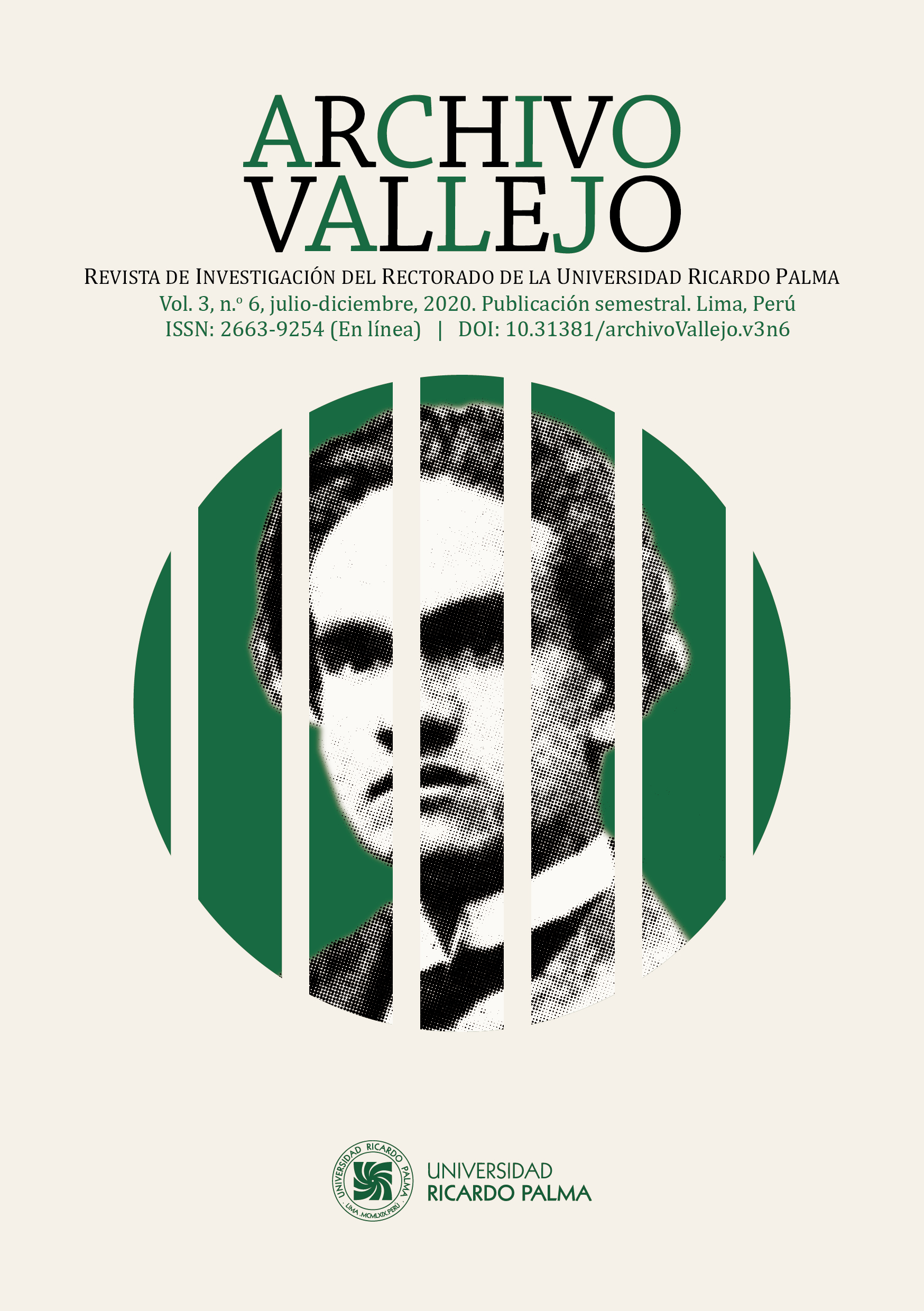Poem "LXI", prison motive, human transcendence and morality or ethics of the good
DOI:
https://doi.org/10.31381/archivoVallejo.v3n6.5209Keywords:
prison motivations, human transcendence, morality or ethics of the good, elements of textualityAbstract
According to Espejo Asturrizaga, when César Vallejo was imprisoned, between November 1920 and February 1921, he wrote eight poems that were included in Trilce; one of them, the one marked with the Roman numeral LXI, whose initial verse is "Esta noche desciendo del caballo", does not reveal, like others, the vision of prison or physical imprisonment, but a form of human transcendence that establishes a moral or ethical rule of good in the chaotic and agonizing human existence. We develop this hypothesis from a historical and socio-cultural perspective, supported by the analysis, interpretation and literary assessment from which we consider that the poem "LXI" is interrelated with the thematic and formal elements of the collection, in a current and futuristic vision, which allows us to notice that in Vallejo's poetry not everything is said, nothing is definitive; on the contrary, everything is a permanent finding and this confirms its validity.
References
De Creeft, J. (1980, 1 de julio). Retrato del poeta Vallejo [Fotografía de escultura]. En Fontserè, C., La aventura humana de José De Creeft. Tiempo de Historia, IV(68), 103. https://gredos.usal.es/bitstream/handle/10366/29095/THVI~N68~P100-109.pdf?sequence=3&isAllowed=y
Delgado, A. (1988). Los móviles existenciales de Trilce. Editor Ernesto Zúñiga Heredia.
Escobar, A. (1973). Cómo leer a Vallejo. P. L. Villanueva Editor.
Espejo Asturrizaga, J. (1965). César Vallejo: itinerario del hombre, 1892-1923. Librería Editorial Juan Mejía Baca.
González Vigil, R. (2019). En Vallejo, C., Todos los poemas (t. I). Universi dad Ricardo Palma, Editorial Universitaria.
Orrego, A. (2011). Obras completas. Editorial Pachacútec.
Orrego, A. (2016 [1922]). Palabras prologales. En Vallejo, C., Trilce (pp. i-xvi). Edición facsimilar. Academia Peruana de la Lengua.
Ortega, J. (2014). César Vallejo. La escritura del devenir. Taurus.
Pantigoso, M. (2000). Se llama Lomismo que padece (eccehomo). Intihuatana Ediciones.
Vallejo, C. (1985). Obra poética completa. Biblioteca Ayacucho.
Vallejo, C. (1987). Desde Europa. Crónicas y artículos (1923-1938). Recopi lación, prólogo, notas y documentación por Jorge Puccinelli. Edi ciones Fuente de Cultura Peruana. https://fundacionbbva.pe/wp content/uploads/2016/04/libro_000001.pdf
Vallejo, C. (1991). Obras completas (t. I). Obra poética. Banco de Crédito del Perú.
Vallejo, C. (2016 [1922]). Trilce. Edición facsimilar. Academia Peruana de la Lengua.
Downloads
Published
How to Cite
Issue
Section
License
Copyright (c) 2020 Wellington Castillo Sánchez

This work is licensed under a Creative Commons Attribution 4.0 International License.
Los contenidos publicados en la revista están bajo una licencia CC-BY 4.0, la cual permite:
- Compartir, copiar y redistribuir el material en cualquier medio o formato.
- Adaptar, remezclar, transformar y construir a partir del material para cualquier propósito, incluso comercialmente.
Bajo los siguientes términos:
- Atribución. Usted debe dar crédito de manera adecuada, brindar un enlace a la licencia, e indicar si se han realizado cambios. Puede hacerlo en cualquier forma razonable, pero no de forma tal que sugiera que usted o su uso tienen el apoyo de la licenciante.















